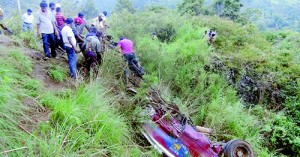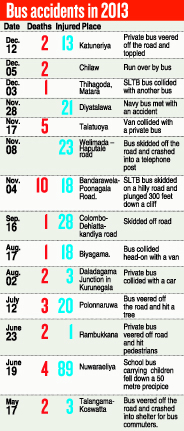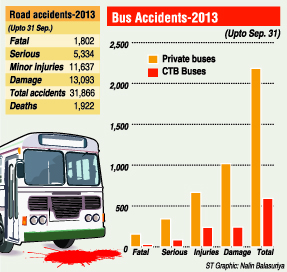News
Spiralling fatalities focus attention on untrained bus drivers
Buses, the common man’s mode of transport, are creating unacceptable risks to life, and private buses – the largest component of the

On November 4, an SLTB bus skidded and fell off a precipice on the Bandarawela–Poonagala Road, killing 10 people and injuring18 others. Pic by Ratnam Kougulan
nation’s 23,000 strong fleet – are the most dangerous, experts warn.
Transport authorities agree, and say transport licence rules will be altered to prevent private fleets from employing drivers with no passenger transport skills.
The latest in a string of accidents was reported on Thursday (December 12) night when two people were killed and another 13 injured when the private bus in which they were traveling veered off the road and toppled at Katuneriya on the Colombo-Chilaw road.
This was just a few days after a horrific accident near the Munneswaram Kovil in Chilaw in which two women died. The crowded private bus not only hit Leena Vanigasundari, a resident of Munneswaram but also ran over 60-year-old Malani Perera, a passenger who fell off the footboard.
On December 3, a six-year-old boy was killed when a Sri Lanka Transport Board bus (SLTB or formerly CTB) bus collided with a private bus in Thihagoda, Matara. Little Laknidu, who was travelling in the private bus died on the spot while eight others were admitted to the Matara General Hospital with injuries.

A six-year-old boy was killed when a Sri Lanka Transport Board (SLTB or formerly CTB) bus collided with a private bus in Thihagoda, Matara. Pic by Krishan Jayaruk
This year also saw one of the worst bus accidents of recent times. On November 4, an SLTB bus skidded and fell off a precipice on the Bandarawela–Poonagala Road, killing 10 people and injuring18 others.
Also in November, more than 23 passengers were injured when their bus skidded off the road and crashed into a telephone post on the Welimada-Haputale road, and five people, including two children aged 10 and three, were killed when a van collided with a speeding private bus in Kandy.
A similar accident took place in June when an 11-year-old boy and his two-year-old sister from Rambukkana became victims of a speeding private bus while they were walking to a nearby temple.
According to Traffic Police sources, from January to October this year, 2184 accidents involving private buses and 592 accidents involving SLTB buses have been reported.
Of this number, 186 accidents caused fatalities, mostly from private buses (157) while SLTB buses accounted for 29 fatal accidents. Injuries were caused to 1009 people from private bus accidents and 323 people suffered injuries from SLTB accidents.
About 18,000 of the 23,000 buses in the country are private buses.
The roads are a chaotic scramble of traffic, said retired deputy inspector general of traffic police, Camillus R. Abeygoonawardena, and there is a deplorable absence of road courtesy and discipline.
“There is a certain degree of selfishness and no policy of sharing the road. The quality of driving has to be improved.
“At present, an examiner tests more than 30-40 drivers per day,” he said, saying the system was overcrowded. All areas of driving needed to be thoroughly tested and fraudulent licence issuing discouraged.
“Driving is not only learning how to change gears or steering a vehicle. Driver testing standards and training should be improved.”
There are not enough mobile traffic police, Mr Abeygoonawardena said.
“At present there are only static policemen. Rarely does one see mobile police vehicles. There should be unmarked police vehicles observing violators with detection equipment such as video cameras. When they are close to the violator, they can place the police siren on top of the vehicle. This will create a fear psychosis among drivers.
“During my tenure I deployed only 10 policemen in civvies but all bus drivers thought police officers were in almost all buses.
“Road safety should be a national policy, and passenger transport should be given priority,” the former traffic police chief said.
 Police Spokesman SSP Ajith Rohana told the Sunday Times police in civilian clothes would be deployed on long-distance buses during this festive season.
Police Spokesman SSP Ajith Rohana told the Sunday Times police in civilian clothes would be deployed on long-distance buses during this festive season.
With the increasing number of accidents, the Motor Traffic Department is hoping to make passenger transport a distinct category when issuing licenses from next year. Passenger transport drivers will also receive training in first aid, technical capability and road ethics.
“Today even a lorry driver can be a passenger bus driver. This has to be changed,” said Motor Traffic Commissioner S.H. Harischandra.
The draft proposal was being reviewed by the Attorney General’s Department.
The National Transport Medical Institute, Road Passenger Transport Authority, National Transport Commission and the Motor Traffic Department are joining to compile the new training programme.
Transport expert Professor Amal Kumarage said the lack of bus timetables were a major contributing factor to most accidents.
Provincial road authorities had failed to implement proper route management. “There is no proper timetable and this has led to bus drivers competing for passengers, thereby creating an unsafe environment,” he said.
Prof. Kumarage, the former chairman of the National Transport Commission, said that there was a dire need for “demand-based scheduling” where there was a ratio between buses and passengers.
“Provincial authorities should ensure that the timetable does not favour some bus operators by giving others off-peak times. If the timetables are corrected there will be no speeding and more responsible driving as buses won’t be competing to pick up passengers,” he said.
Prof. Kumarage said SLTB buses had the best drivers, but with irregular scheduling they were forced to compete with private buses to the detriment of their driving.


